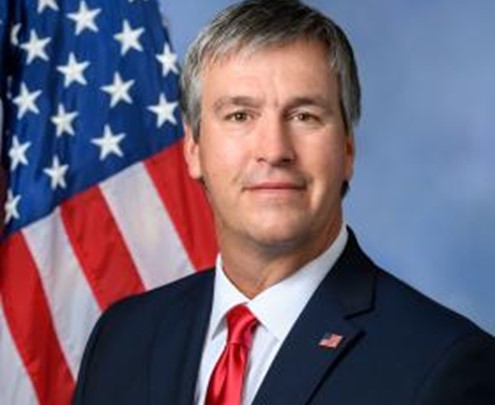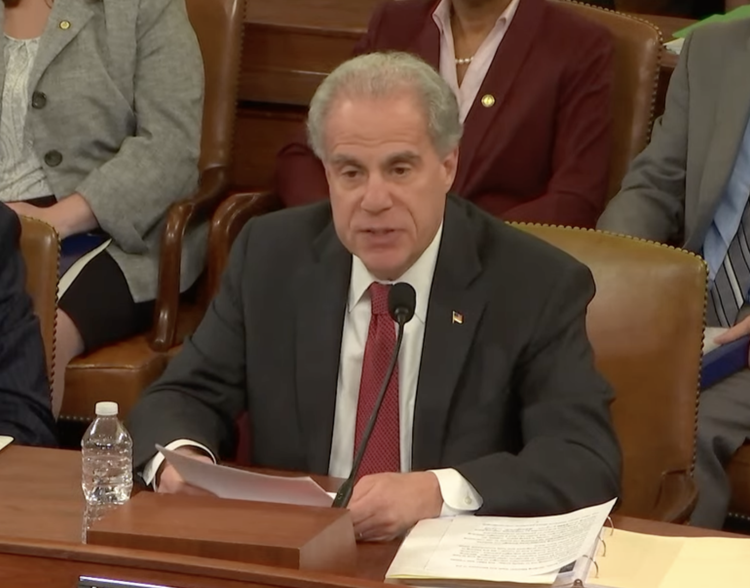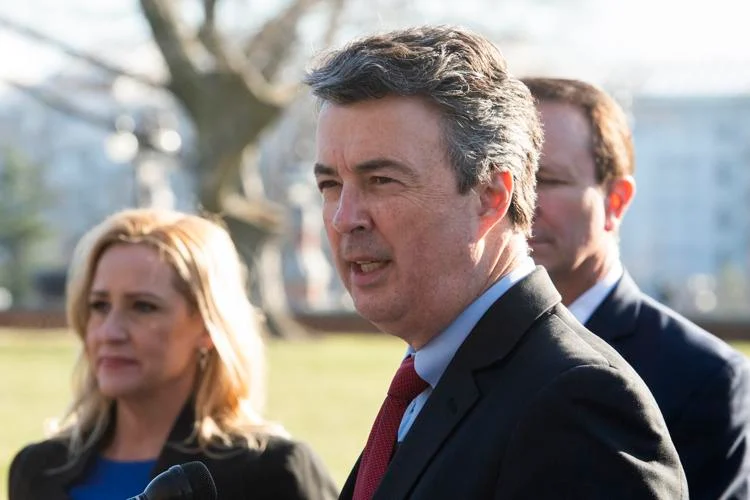Barry Moore cosponsors resolution calling for end of Ukraine aid

Congressman Barry Moore was one of ten cosponsors of a controversial Ukraine Fatigue resolution introduced by Congressman Matt Gaetz calling for an end to military and financial aid to Ukraine and calling for Ukraine and Russia to reach a peace deal ending the war. “The only person earning an easier buck than Ukrainian war profiteers is Hunter Biden’s art dealer,” said Rep. Moore on Twitter. Congress should support @RepMattGaetz’s resolution and end taxpayer-funded blank checks to Ukraine.” Moore was the only member of the Alabama delegation to join the resolution calling for an end to military aid for Ukraine – which is fighting off a massive invasion by Russia. The other nine cosponsors are Rep. Andy Biggs, Rep. Lauren Boebert, Rep. Paul Gosar, Rep. Marjorie Taylor Greene, Rep. Anna Paulina Luna, Rep. Thomas Massie, Rep. Mary Miller, Rep. Ralph Norman, and Rep. Matt Rosendale. “President Joe Biden must have forgotten his prediction from March 2022, suggesting that arming Ukraine with military equipment will escalate the conflict to ‘World War III,’” Rep. Gaetz said. “America is in a state of managed decline, and it will exacerbate if we continue to hemorrhage taxpayer dollars toward a foreign war. We must suspend all foreign aid for the War in Ukraine and demand that all combatants in this conflict reach a peace agreement immediately.” Moore has had a history of being skeptical of military aid for Ukraine. On January 20, Moore joined a letter led by Rep. Dan Bishop and Senator J.D. Vance to President Biden’s Office of Management and Budget (OMB) Director Shalanda Young demanding a “full crosscutting report” to Congress that includes “U.S. government-wide expenditures for Ukraine and ‘countries impacted by the situation in Ukraine’ since Feb. 24, 2022.” “With an ever-growing federal budget and national debt, Alabamians deserve to know how their tax dollars are being spent – or misspent – on a war between Ukraine and Russia,” said Moore. “I am proud to join Rep. Dan Bishop and Senator J.D. Vance to demand answers and transparency from the Biden administration on these huge outlays of American taxpayer dollars.” In the 117th Congress, Moore signed a resolution led by Rep. Marjorie Taylor Green requesting an audit of all American taxpayer dollars sent to Ukraine. “I was in Ukraine before Afghanistan fell, and at that point in time, the parliament was extremely concerned about [American] energy policy and how we were allowing Putin to basically move the [Nord Stream 2] Pipeline and start production,” Moore said in November. “Even then, parliament saw the issue, but when I got here and started talking to other members, the same group of people here gave Trump such a hard time about a few billion dollars at the U.S. southern border.” “As fentanyl and drugs and illegals poured across our southern border, a few billion dollars, four billion, was just a little too much money,” Moore continued. “And now we are looking at $40 billion one week, $14 billion the next week with little to no oversight. Ukraine is a young democracy, and we are sending American taxpayer money over there with no oversight. It creates problems, it creates corruption, it’s not good for the American taxpayer or the American people.” Gaetz and Moore’s position is not shared by even many Republicans. Congressman Mike Rogers, who chairs the powerful House Armed Services Committee, has been a vocal proponent of military aid for Ukraine. “Now is the time for the Biden and Scholz governments to follow the lead of our U.K. and Eastern European allies – Leopard 2 tanks, ATACMS, and other long-range precision munitions should be approved without delay,” Chairman Rogers said. The United States is providing Ukraine with over $100 billion in aid – including M1 Abrams main battle tanks, Lancer anti-tank missiles, Bradley infantry fighting vehicles, Stryker combat vehicles, Stinger surface-to-air missiles, Patriot surface-to-air missile systems, multiple rocket launch systems (MRLS), 155 mm Paladin self-propelled artillery systems, and other weapons. Ukrainian President Volodymyr Zelensky is now asking the United States and allies to provide Ukraine with modern jet fighters, including F16s. Zelensky has been meeting with European leaders this week and appears to be close to a deal with EU members on fighter jets. There is wide speculation that in the coming weeks that Russia will launch a massive new offensive in the war. Moore is in his second term representing Alabama’s Second Congressional District. To connect with the author of this story or to comment, email brandonmreporter@gmail.com.
Alabama Power customers to get $62 million in rebates

On Tuesday, the Alabama Public Service Commission (PSC) voted to give $62 million back to Alabama Power Company customers. After reviewing Alabama Power’s financials, the PSC determined that the utility had overestimated fuel costs this winter. The vote to rebate the funds was a 3 to 0 vote at the PSC’s most recent meeting. The PSC regulates state-licensed monopolies. Alabama Power Company is guaranteed by the PSC to make a profit, but it cannot price gouge its customers. Alabama Power Customers are expected to get a credit on their August bills of about $20. “I think a direct refund is the best way to proceed here, but I also believe the refund would be more impactful if it is made during the summer when residential usage and, therefore, their bills are higher and would equate to a larger return for those consumers,” said Public Service Commission President Twinkle Andress Cavanaugh during the meeting. The purpose of the Alabama Public Service Commission is to provide a balance between regulated companies and consumers to provide consumers with safe, adequate, and reliable services at affordable rates. The PSC approved three rate increases for Alabama Power during 2022 due to rising fuel costs. The entities regulated by the APSC include privately owned corporations providing electric, gas, and water service to the public and select providers of telecommunication and wastewater services. Additionally, railroads, buses, trucking companies, and taxis operating outside police jurisdictions on a for-hire basis remain under the oversight of the APSC. Effective July 1, 2018, Transportation Network Companies were placed under the jurisdiction of the APSC pursuant to Alabama Legislative Act 2018-127. The APSC has a staff of 66. The PSC is governed by a president and two associate commissioners who are elected on a statewide basis. Each commissioner is elected to serve a four-year term, with the president’s term staggered by two years from the associate commissioners’ terms. The other two commissioners, Jeremy Oden and Chip Beeker, were just reelected in 2022. Cavanaugh faces voters in the 2024 presidential election. The State of Alabama has two primary electric power generators – the Alabama Power Company (a division of the Southern Company) and the Tennessee Valley Authority (TVA). Because TVA is an entity of the federal government and the U.S. Constitution gives federal law supremacy over state law, the APSC does not have regulatory authority over TVA. Alabama Power has 1.5 million customers. Twenty-five percent of the company’s power is generated by burning oil and natural gas, 43 percent is produced by burning coal, 24 percent is nuclear, and 8 percent is produced through hydroelectric dams. 24.34% of Alabama Power’s costs are spent on fuel and purchased power. The company has total revenues of $5,678,066,345. To connect with the author of this story or to comment, email brandonmreporter@gmail.com.
Tommy Tuberville, Katie Britt join Kevin Cramer and colleagues to introduce Fair Access to Banking Act

U.S. Senators Tommy Tuberville and Katie Britt joined Sen. Kevin Cramer and 35 of their Senate colleagues to introduce the Fair Access to Banking Act, a bill to protect fair access to financial services by preventing banks and financial institutions from discriminating against law-abiding businesses. The legislation would bar financial institutions from refusing or limiting banking services for political purposes. “Banks should make lending decisions based solely on economic factors – not woke political concerns,” said Sen. Tuberville. “Big banks are bowing to pressure from woke activists who oppose loans being given to businesses that don’t fall in line with the left’s agenda. No financial institution should be pressured to cut off lending to a legitimate business. Financial discrimination is un-American and unacceptable. I’m proud to support the Fair Banking Act to push back against attempts to weaponize the banking sector for political reasons.” “There is no place in our society for discrimination, and big banks and financial institutions are no exception,” said Sen. Cramer. “The Biden administration and their liberal base are weaponizing the financial system to defund, debank, or discredit industries they do not like. It is fundamentally unfair. Our bill imposes serious consequences for discriminatory decisions or de facto bans of legal industries.” The purpose of the Fair Access to Banking Act is to protect fair access to financial services and to ensure banks operate in a safe and sound manner, basing their judgments and decisions on impartial, individualized risk-based analysis developed through empirical data and evaluated under quantifiable standards. If enacted, this bill would: · Penalize banks and credit unions with over $10 billion in total consolidated assets, or their subsidiaries, if they refuse to do business with any legally-compliant person who meets the criteria described above. · Prevent payment card networks from discriminating against any qualified and legally-compliant person because of political or reputational considerations. · Codify the core requirements found in the Trump Administration’s Fair Access Final Rule; · Require qualified banks to provide written justification for why they are denying a person financial services; and · Punish providers who fail to comply with the law by disqualifying them from using discount window lending programs, terminating their status as an insured depository institution or insured credit union, or imposing a civil penalty of up to $10,000 per violation. Sen. Cramer’s legislation is in response to United States banks and financial institutions increasingly using their economic standing to categorically discriminate against legal industries. There are a number of examples of banking discrimination happening in recent years: · In 2018, Citigroup instituted a policy to withhold project-related financing for coal plants · In 2020, five of the country’s largest banks announced they would not provide loans or credit to support oil and gas drilling in the Arctic National Wildlife Refuge, despite explicit congressional authorization. · Such exclusionary practices extend to industries protected by the Second Amendment too, with Capital One, among other banks, including “ammunitions, firearms, or firearm parts” in the prohibited payments section of its corporate policy manual, and payment services like Apple Pay and PayPal denying their services for transactions involving firearms or ammunition. · In Alabama, a number of banks and underwriters backed out of financing Gov. Ivey’s plan to build new megaprisons due to political concerns and pressure from woke anti law and order activists. The problems getting financing for the project forced Gov. Ivey to go to the state legislature to pursue a bond issue, delayed the project by two years, and greatly increased the cost of the project. In response to these developments, the Trump Administration created the Fair Access Rule – which Sen. Cramer helped craft and is codified in this legislation – to prevent these examples and other acts of discrimination, but the rule’s implementation has since been paused under President Joe Biden. This legislation also expands on the Freedom Financing Act, which was one of the first bills Cramer introduced when he joined the Senate in 2019. The bill is supported by the National Shooting Sports Foundation (NSSF), National Rifle Association (NRA), Independent Petroleum Association of America (IPAA), National Mining Association (NMA), National Association of Wholesaler-Distributors, and the Day 1 Alliance. To connect with the author of this story or to comment, email brandonmreporter@gmail.com.
Katie Britt and Shelley Capito lead challenge to Joe Biden’s Waters of the U.S. rule

U.S. Senators Katie Britt and Tommy Tuberville joined Sen. Shelley Moore Capito and all of their Senate Republican colleagues introduced a formal challenge to the Biden Administration’s Waters of the United States (WOTUS) rule through a Congressional Review Act (CRA) joint resolution of disapproval. If both Houses of Congress pass a resolution rejecting a federal regulation under the CRA, that regulation is effectively nullified. This resolution comes after Joe Biden’s Environmental Protection Agency (EPA) and the U.S. Army Corps of Engineers announced a new rule in December 2022 repealing the Navigable Waters Protection Rule (NWPR), changing the definition of Waters of the United States in a way that will significantly expand federal regulatory authority over farmers, foresters, builders, developers, businesses, and even homeowners. “The Biden Administration in two years has racked up more regulations than the Obama Administration did in eight years,” Sen. Britt said. “They’re continuing their red tape regime with yet another reckless rulemaking decision that would prioritize their leftwing political agenda at the expense of hardworking Americans. This type of job-killing overregulation would strangle Alabama farmers, cattlemen, manufacturers, energy producers, builders, landowners, and small businesses.” “Alabamians have tended to our own land, waterways, and resources for generations, and we remain best positioned to preserve and utilize them for generations to come,” Britt said. Sen. Shelley Moore Capito is the Ranking Member of the Senate Environment and Public Works (EPW) Committee. “With its overreaching navigable waters rule, the Biden administration upended regulatory certainty and placed unnecessary burdens directly on millions of Americans,” stated Capito. “This Congressional Review Act resolution of disapproval will give every member of Congress the chance to stand with farmers, ranchers, landowners, and builders, and protect future transportation, infrastructure, and energy projects of all kinds in their states. I appreciate the widespread support we’ve received in both the Senate and House, and across the country, as we fight to place an important check on this misguided overreach from the Biden administration.” As Senator Capito introduced the CRA resolution in the Senate, U.S. Rep. Sam Graves, the Chairman of the House Committee on Transportation and Infrastructure (T&I), simultaneously introduced an identical resolution in the House. “As American families and businesses continue suffering under the economic crises caused by the disastrous Biden policies of the last two years, this Administration has inexplicably decided to move the country back toward the costly and burdensome WOTUS regulations of the past,” said Chairman Graves. “In an unnecessary drain on federal resources, the Administration clumsily put forward its rule before the Supreme Court has issued a ruling in the Sackett case, which will affect and alter what the Administration has put forward. Congress has the authority and responsibility to review onerous rules like this one handed down from the Executive Branch, and I hope our colleagues on both sides of the aisle will join in this effort to preserve regulatory clarity and prevent overzealous, unnecessary, and broadly defined federal power.” Numerous industry leaders and stakeholders have issued statements supporting the effort to overturn this rule. “As farmers, we want and need to protect the nation’s waters,” Alabama Farmers Federation President Jimmy Parnell said. “This rule muddies the water for property owners, will make conservation more difficult, and will create huge liabilities for farmers.” American Farm Bureau Federation (AFBF) President Zippy Duvall said, “Farmers and ranchers are committed to protecting the land and water they rely on to grow food for America’s families. Unfortunately, the back and forth over water regulations threatens the progress made to responsibly manage natural resources. We appreciate Congressmen Sam Graves, David Rouzer, and Senator Shelley Moore Capito for introducing a joint resolution to use the Congressional Review Act to stop the new Waters of the U.S. rule from going into effect. Farmers deserve rules that don’t require a team of attorneys and consultants to identify ‘navigable waters’ on their land.” The American Pipeline Contractors Association (APCA) said, “The American Pipeline Contractors Association is grateful for the introduction of this Congressional Review Act resolution and urges Congress to come together and swiftly overturn the new burdensome and unnecessary WOTUS regulations. There is widespread understanding in Washington that permitting reforms and regulatory overhaul are necessary to meet infrastructure goals and unlock the full potential of American energy, but this decision from the administration directly contradicts those goals. APCA urges the Biden administration to roll back this regulation as soon as possible and to instead work with Congress to undertake meaningful action toward reforming pipeline and general construction permitting processes.” American Road & Transportation Builders Association Vice President of Legal & Regulatory Issues Nick Goldstein said, “The recent Waters of the United States definition from the Environmental Protection Agency (EPA) would add more delay and confusion to the delivery of critical transportation improvements. By muddying federal Clean Water Act jurisdiction, EPA’s regulation directly contradicts the bipartisan infrastructure law’s goal of improving the project review and approval process. That’s why ARTBA supports House and Senate legislation to rescind the WOTUS rule.” Associated General Contractors of America (AGC) Vice President of Government Relations Jimmy Christianson said, “Senate Environment and Public Works Committee Ranking Member Shelley Moore Capito and House Transportation and Infrastructure Committee Chairman Sam Graves are right to express disapproval with the administration’s overreach and expansion of the waters of the United States regulatory program. AGC is disappointed that the agencies rushed through the sixth change in the requirements, in almost as many years, just as the U.S. Supreme Court is poised to decide on a related case. Employers try in good faith to keep pace with ever-shifting requirements that carry criminal as well as civil penalties for noncompliance.” Energy Marketers of America (EMA) President Rob Underwood said, “The Energy Marketers of America (EMA) recognize the enormous impacts the Biden Administration’s ‘Waters of the United States’ rule will place on small business energy marketers. In large part, WOTUS will determine whether costly land use restrictions will be imposed on new building or expansion projects, such as adding renewable liquid fuel pumps and/or electric charging stations. EMA supports the joint resolution of disapproval under the Congressional Review Act on the Biden Administration’s WOTUS rule.” Leading Builders of America CEO Ken Gear said,
State sets new record in exports in 2022

Governor Kay Ivey on Thursday announced that Alabama exports surged to over $25.5 billion in 2022, setting a new annual record. Ivey said this is yet another indicator that the state’s economy is performing strongly. “Our record-breaking success when it comes to our exports is yet another example of the far reach of the ‘Made in Alabama’ brand and a direct result of our incredible companies and top-notch workforce,” said Gov. Ivey. “Exporting is a fundamental economic pillar that supports growth in Alabama, contributing economic vitality and spurring job creation across the state.” 2022’s surging export activity was driven by rising overseas shipments of Alabama-made vehicles, aerospace parts, chemicals, minerals, metals, and paper products, according to data from the Alabama Department of Commerce. The value of Alabama exports in 2022 jumped 22% compared to 2021, which also saw a substantial increase from the COVID-19 stunted 2020. Alabama exports have soared almost 47% since 2020 when global trade tensions and the COVID-19 pandemic dragged down shipments. The 2022 export total surpassed the previous record year – 2017’s $21.7 billion – by 17.5%. Greg Canfield is the Secretary of the Alabama Department of Commerce. “Setting a new annual export record is just another example of the economic success that Alabama is enjoying right now,” said Sec. Canfield. “Despite turbulence on the national scene, Alabama’s economy is really humming on all cylinders and can keep rolling as a bounty of growth projects bring in new jobs and investment.” Economic developer Dr. Nicole Jones told Alabama Today, “The Made in Alabama brand is recognized throughout the world thanks to driven folks in the public and private sector who have positive business relationships and ongoing communication with our trade partners.” Alabama exports spanned the globe during 2022, going to 196 countries. The Top 5 destinations for Alabama exports were: · Germany: $4.3 billion, a 16% gain over 2021 · China: $3.8 billion, a 10% increase over the previous year · Canada: $3.2 billion, which was up 3% · Mexico: $2.8 billion, an 11% increase · Japan: $1 billion, a 42% jump from 2021 Other top destinations were South Korea, Brazil, the United Kingdom, Belgium, and Australia. Christina Stimpson is the director of Commerce’s Office of International Trade. Stimpson said that broad-based gains for Alabama exports represent good news for companies back home because it generates increased production, additional investment, and new jobs. “Seeing a new annual export record demonstrates the success of operating and producing in Alabama. Growth in production from exports means job creation for our communities,” said Stimpson. “Export Alabama is here to support Alabama businesses launching into export or expanding to new global markets.” Commerce’s Office of International Trade offers resources to help Alabama companies enter profitable new overseas markets through frequent trade and business development missions, training, foreign-market information, and international contacts. The Office of International Trade is a partner in Export Alabama. It is a seamless network of international trade agencies that share the fundamental objective of helping Alabama companies expand their business internationally. “The strength of Alabama’s companies is a result of dedicated human capital,” Jones said. “These newest export numbers speak volumes; products made by Alabamians are an integral part of the global economy.” Alabama’s No. 1 export category — transportation equipment — helped power the state’s record performance during 2022, climbing above $11.4 billion, a gain of 9%. The category includes motor vehicles and parts, aerospace products and parts, and ships, among other things. The largest part of this category was the exports of Alabama-made vehicles which approached $8.9 billion last year, an increase of 13%. The top international destinations for Alabama-made vehicles were Germany, China, and Canada, which all saw increases in 2022. According to Commerce data, overseas shipments of aerospace products and parts increased by an incredible 21% to exceed $1.7 billion. All of Alabama’s top-ranking export categories posed major gains during 2022. Alabama exported $2.7 billion in chemicals – an increase of 19.5%. Alabama exported $2 billion in minerals and ore — up 178%. The state exported $1.6 billion of primary metals — up 20%. Alabama exported $1.6 billion in paper products — up 35% To connect with the author of this story or to comment, email brandonmreporter@gmail.com.
Disaster unemployment assistance available to workers in Mobile and Morgan Counties

On Thursday, Alabama Department of Labor Secretary Fitzgerald Washington announced that, since disaster assistance has been extended to Mobile and Morgan counties, workers who became unemployed as a direct result of the severe storms, straight-line winds, and tornadoes on Jan. 12 in those two Counties may qualify for unemployment assistance. Counties previously designated are Autauga, Coosa, Elmore, Dallas, Green, Hale, Sumter, and Tallapoosa Counties. People who live in or worked in these counties and became unemployed due to severe storms, straight-line winds, and tornadoes during the period of January 12, 2023, may be eligible for assistance under the Disaster Unemployment Assistance (DUA) program, which was triggered when President Joe Biden designated the area as a disaster area on January 15, 2023. “Generally, those who are eligible for state unemployment benefits are not eligible for DUA, but a claimant may qualify if state unemployment compensation benefits are exhausted,” said Washington. “If you believe you are entitled to these benefits, I urge you to file a claim to see if you are eligible.” People who may be eligible for Disaster Unemployment Assistance include: · individuals who no longer have a job · are unable to reach the place of employment · or were scheduled to start work in the major disaster area and the job no longer exists · those who became the breadwinner or major support of the family because the head of household died, · those who cannot work because of an injury incurred during the major disaster All of the previously described circumstances must be as a direct result of the severe storms, straight-line winds, and tornadoes. Claims can be filed through ADOL’s website or by calling 1-866-234-5382. The deadline to file a DUA claim is March 10, 2023 for Mobile and Morgan Counties. The deadline to file a DUA claim is March 1, 2023, for Autauga, Coosa, Dallas, Elmore, Green, Hale, Sumter, and Tallapoosa Counties. Pursuant to President Biden’s major disaster declaration, small businesses in Autauga, Coosa, Dallas, Elmore, Greene, Hale, Sumter, Tallapoosa, Morgan, and Mobile Counties are eligible for both Physical and Economic Injury Disaster Loans from the Small Business Administration (SBA). Small businesses and most private nonprofit organizations in the following adjacent counties are eligible to apply only for SBA Economic Injury Disaster Loans (EIDLs): Bibb, Chambers, Chilton, Choctaw, Clay, Lee, Lowndes, Macon, Marengo, Montgomery, Perry, Pickens, Randolph, Shelby, Talladega, Tuscaloosa and Wilcox in Alabama; and Kemper, Lauderdale, and Noxubee in Mississippi. Applicants may apply online using the Electronic Loan Application (ELA) via SBA’s secure website and should apply under SBA declaration #17759. Disaster loan information and application forms can also be obtained by calling the SBA’s Customer Service Center at 800-659-2955. To connect with the author of this story, or to comment, email brandonmreporter@gmail.com.
Alabama Power to refund customers $62 million on August bill

Alabama Power customers are getting a refund this summer. The Alabama Public Service Commission on Tuesday approved the refund to be paid to eligible Alabama Power customers in August. The decision came after the company reported it was above the allowed rate of return range by $62 million in 2022, al.com reported. There’s no word yet on how much customers will receive as part of that refund. In December, Alabama Power announced its third rate increase of 2022, citing federal mandates, inflation, and economic conditions. That means the average residential customer, using 1,000-kilowatt hours a month, is paying about $24 for electricity since January 2022. Republished with the permission of The Associated Press.
U.S. says China balloon could collect intelligence signals

The China balloon shot down by the U.S. was equipped to detect and collect intelligence signals as part of a huge, military-linked aerial surveillance program that targeted more than 40 countries, the Biden administration declared Thursday, citing imagery from American U-2 spy planes. A fleet of balloons operates under the direction of the People’s Liberation Army and is used specifically for spying, outfitted with high-tech equipment designed to gather sensitive information from targets across the globe, the U.S. said. Similar balloons have sailed over five continents, according to the administration. A statement from a senior State Department official offered the most detail to date linking China’s military to the balloon that was shot down by the U.S. last weekend over the Atlantic Ocean. The public details outlining the program’s scope and capabilities were meant to refute China’s persistent denials that the balloon was used for spying, including a claim Thursday that U.S. accusations about the balloon amount to “information warfare.” On Capitol Hill, the House voted unanimously to condemn China for a “brazen violation” of U.S. sovereignty and efforts to “deceive the international community through false claims about its intelligence collection campaigns.” Republicans have criticized President Joe Biden for not acting sooner to down the balloon, but both parties’ lawmakers came together on the vote, 419-0. In Beijing, before the U.S. offered its new information, Chinese Foreign Ministry spokesperson Mao Ning repeated her nation’s insistence that the large unmanned balloon was a civilian meteorological airship that had blown off course and that the U.S. had “overreacted” by shooting it down. “It is irresponsible,” Mao said. The latest accusations, she said, “may be part of the U.S. side’s information warfare against China.” Underscoring the tensions, China’s defense minister refused to take a phone call from Defense Secretary Lloyd Austin to discuss the balloon issue on Saturday, the Pentagon said. Secretary of State Antony Blinken canceled a planned weekend trip to Beijing. The U.S. flatly contradicted China’s version of events, saying that imagery of the balloon collected by American U-2 spy planes as it crossed the country showed that it was “capable of conducting signals intelligence collection” with multiple antennas and other equipment designed to upload sensitive information and solar panels to power them. Jedidiah Royal, the U.S. assistant defense secretary for the Indo-Pacific, told a Senate Appropriations subcommittee that the military has “some very good guesses” about what intelligence China was seeking. More information was expected to be provided in a classified setting. Senior FBI officials who briefed reporters on the condition of anonymity under ground rules set by the bureau said just a few pieces of the balloon had arrived at the FBI’s Quantico, Virginia, lab for investigation. So far, investigators have parts of the balloon canopy, wiring, and what one official called “a very small amount of electronics.” The official said it was “very early for us to assess what the intent was and how the device was operating.” According to two U.S. officials, the balloon recovery efforts were temporarily suspended on Thursday due to high seas. They said some balloon debris was intact on the ocean floor, and divers had recovered potentially high-value equipment over the past day and a half. Another official said that some of the recovered equipment components had English writing or markings on them, but it wasn’t clear if they were American parts or from another English-speaking country. The official said the more highly technical parts recovered did not have any overt markings. Much of the debris is concentrated in two separate sections of an area 15 football fields long and 15 fields across, according to the officials who spoke on condition of anonymity because of the sensitivity of the collection process. The State Department official, providing details to reporters by email, also on condition of anonymity, said an analysis of the balloon debris was “inconsistent” with China’s explanation that it was a weather balloon that went off course. The U.S. is reaching out to countries that have also been targeted, the official said, to discuss the scope of the Chinese surveillance program, and is looking into potential action that “supported the balloon’s incursion into U.S. airspace.” The official said the U.S. has confidence that the manufacturer of the balloon shot down on Saturday has “a direct relationship with China’s military and is an approved vendor of the” army. The official cited information from an official PLA procurement portal as evidence of the connection between the company and the military. State Department spokesman Ned Price would not identify the other countries the U.S. says have also been targeted. Nor would he reveal how the U.S. knows there have been Chinese incursions over those countries’ territory, saying to do so could compromise intelligence sources and methods. The release of new information appeared to be part of a coordinated administration response, with multiple officials appearing before congressional committees to face questions about the balloon. Testifying before the Senate Foreign Relations Committee, Deputy Secretary of State Wendy Sherman said officials had taken “all necessary steps to protect sensitive information” and had been able to study and scrutinize the balloon and its equipment. “We will continue to answer the dangers posed by the PRC with determination and resolve,” Sherman said, referring to the People’s Republic of China. “We will make clear to the PRC that violations of our sovereignty and the sovereignty of other countries are unacceptable.” At a separate Senate subcommittee hearing, lawmakers repeatedly pressed administration officials, including Pentagon military leaders, about why the balloon was not shot down over sparsely populated areas of Alaska. And they questioned whether allowing the balloon to transit such a large area set a precedent for future spying efforts by China and others. “It defies belief that there was not a single opportunity to safely shoot this spy balloon prior to the coast of South Carolina,” said Sen. Susan Collins, R-Maine. “By the administration’s logic, we would allow the Chinese to fly surveillance balloons over the Pentagon or other sensitive sites and populated areas.”
Prosecutors, watchdogs want more time to prosecute pandemic fraud

Criminals made off with billions of dollars that lawmakers made available for pandemic unemployment insurance. Government officials are now warning lawmakers that they are running out of time to prosecute those who stole it. Larry Turner, the inspector general for the U.S. Department of Labor, again asked lawmakers on the House Ways and Means Committee to pass legislation to extend the statute of limitations on unemployment fraud during the pandemic. The statute of limitations for unemployment fraud will begin to expire in early 2025 without action from Congress, Turner said. “Unemployment insurance crimes often include complex schemes that require significant resources and time to investigate,” he said. Turner said Congress should extend the statute of limitations from five years to 10 years. Congress previously extended the statute of limitations for other types of pandemic fraud, including the Paycheck Protection Program and Economic Injury Disaster Loan program. “Extending the statute of limitations for fraud associated with pandemic-related UI programs will help ensure investigators and prosecutors have time to effectively pursue and hold accountable those groups and individuals that targeted and defrauded the program, and that they do not escape justice,” said Michael Horowitz, chairman of the Pandemic Response Accountability Committee. The U.S. Department of Labor’s Office of Inspector General’s unemployment fraud investigations resulted in more than 1,200 indictments or initial charges from April 2020 through January 2023. Each week that office continues to open more than 100 new unemployment insurance fraud-related investigative matters, according to the U.S. Government Accountability Office. Turner on Wednesday told the committee that of the more than $888 billion in total federal and state unemployment insurance benefits distributed during the pandemic at least $191 billion could have been improper payments, “with a significant portion attributable to fraud.” Turner told members of the House Ways and Means Committee during a hearing. That’s up from a previous estimate of $163 billion. Republished with the permission of The Center Square.
Steve Marshall leads 15 AGs, urging Congress to limit, rescind federal emergency powers

Sixteen attorneys general are urging members of Congress to modify, clarify, and rescind an emergency-use authorization authority still being used by federal agencies to mandate coronavirus-related policies. The letter sent at the end of January to House Speaker Kevin McCarthy and House Committee on Energy & Commerce Chair Cathy McMorris Rogers, both Republicans, relates to curtailing the authority of the U.S. Department of Health and Human Services and Food and Drug Administration. The AGs have requested that Congress override existing emergency-use authorization policies still in effect and to conduct rigorous oversight to establish what mistakes were made related to current and past implementation of the federal authority. They also asked Congress to “consider revising the liability protections provided by a prior Congress, and confirm what President [Joe] Biden has admitted and what the American people in their sound judgment know: any valid grounds for claiming a state of medical emergency due to COVID have ended; normalcy and the rule of law must be restored.” Led by Alabama Attorney General Steve Marshall, the coalition represents the states of Alaska, Arkansas, Idaho, Indiana, Iowa, Kansas, Kentucky, Louisiana, Mississippi, Montana, Nebraska, South Carolina, Tennessee, Texas, and Utah. Texas Attorney General Ken Paxton, who has sued the administration over its COVID-related mandates, said the Biden administration “has attempted to use the pandemic as a pretext for instituting a number of unrelated left-wing policy objectives. HHS and FDA have also abused the emergency powers to force vaccine injections, which can have severe, adverse side effects on young children and healthy adults even though they are the least likely to be impacted by Covid-19.” The attorneys general argue that HHS and FDA continue to misuse the authority granted to them for times of emergency, specifically relying on emergency powers “to justify numerous uses of novel vaccines that are not only failing to halt the transmission of COVID but are also exposing young people (who are least likely to be harmed by COVID) to unnecessary risks,” the letter states. “Shockingly,” they write, “the FDA is still invoking its emergency use authorization authority to push [COVID-19] vaccines out to infants.” The agencies are doing so after Biden said “the pandemic is over” last September. He told 60 Minutes, “the pandemic is over. We still have a problem with COVID. We’re still doing a lot of work on it. But the pandemic is over. If you notice, no one’s wearing masks. Everybody seems to be in pretty good shape, and so I think it’s changing …” He made the remarks after his administration had sought for months to add another roughly $22 billion to the Omnibus spending bill to fund COVID-related programs, NPR reported at the time. Despite these claims, the president and his administration are using emergency use authorization to justify “an unprecedented expansion of executive power.” “From student loan forgiveness to a moratorium on evictions, the President and his Administration continue to attempt to push through an authoritarian agenda based on an emergency that, according to the President, does not exist,” the AGs wrote. “The idea that we are still in the midst of a medical emergency flies in the face of the facts on the ground. Yet, HHS and FDA continue to perpetrate the myth that an emergency exists to aggrandize their power at the expense of people’s freedom.” They also called on Congress to clarify and amend the various statutory emergency authority provisions the agencies “have abused in their unrealistic and impractical quest to operate under emergency authority indefinitely” and to “narrow unilateral authority that agencies and the president have during times of emergency.” They urged Congress “to move quickly” to “override any remaining emergency use authorizations for COVID vaccines, consider reforms to the sweeping liability shield created in 2005, and ensure that our liberties and system of government are robustly protected against any such future attempts at medical tyranny.” Republished with the permission of The Center Square.


